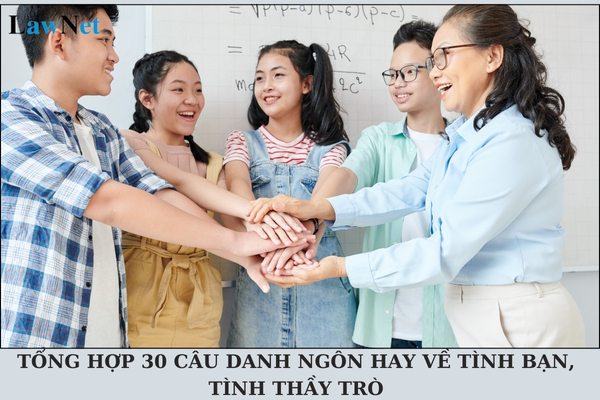Vietnam: What are the 30 quotes on friendship and teacher-student relationship? What is the code of conduct for teachers towards lower secondary school students?
What are the 30 quotes on friendship and teacher-student relationship?
The collection of quotes on friendship and teacher-student relationship is part of the Experiential Activity section under Topic 3: Building Friendship and Teacher-Student Relationships in the 6th-grade program.
Students can refer to the following 30 quotes on friendship and teacher-student relationship:
|
30 quotes on friendship and teacher-student relationship Quotes on Friendship |
Note: Content is for reference purposes only!

What are the 30 quotes on friendship and teacher-student relationship? What is the code of conduct for teachers towards lower secondary school students? (Image from the Internet)
What is the code of conduct for teachers towards lower secondary school students in Vietnam?
Under Article 6 of Circular 06/2019/TT-BGDDT, the code of conduct of teachers towards lower secondary school students in Vietnam is specified as follows:
+ Use standard and easily understandable language, give praise or criticisms to proper entities and in appropriate situations;
+ Stay exemplary, magnanimous, responsible, loving;
+ Respect differences, give fair treatment, counsel, listen to and encourage learners;
+ Actively prevent and combat school violence, build safe, healthy, friendly educational environment
+ Do not offend, hurt, self-seeking; do not repress, prejudice, inflict violence, abuse; do not ignore, avoid or hide learners' violations.
Are teachers in Vietnam allowed to cut educational content without permission?
Under Point b, Clause 1, Article 31 of the lower secondary school, upper secondary school and multi-level school charter issued with Circular 32/2020/TT-BGDDT on the manners of teachers :
Manners and attire of teachers and staff
1. Prohibited acts for teachers and staff:
a) Strip students and coworkers of their honor or dignity; infringe upon bodily integrity of students and coworkers.
b) Act dishonestly during an examination or admission process; act dishonestly during assessment of student performance; skip teaching or cut teaching or educational contents without permission.
c) Distort teaching or educational contents; teach wrong knowledge or contents that are against the education guidelines or viewpoints of the Communist Party of Vietnam and the State.
d) Force students to take extra classes for money; take advantage of educational sponsorship or assistance to forcibly extract cash or kind contributions.
dd) Smoke or consume alcohol or other stimulants while participating in teaching or educational activities.
e) Hinder support given to teaching or educational activities and other activities.
...
Under the above regulations, teachers in Vietnam are not allowed to cut educational content without permission.

